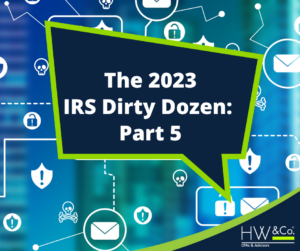 Today, we bring you the final three scams highlighted by the 2023 Dirty Dozen campaign, an annual list compiled by the IRS outlining the most common tax schemes and providing taxpayers with important information about how to protect themselves.
Today, we bring you the final three scams highlighted by the 2023 Dirty Dozen campaign, an annual list compiled by the IRS outlining the most common tax schemes and providing taxpayers with important information about how to protect themselves.
Schemes Aimed at High-Income Tax Filers
There are two types of tax transactions regularly used by unethical tax preparers or promoters to abuse high-income taxpayers and leave them vulnerable: Charitable Remainder Annuity Trusts (CRATs) and monetized installment sales.
A CRAT allows a taxpayer to provide assets to an irrevocable trust, which then donates to a certain charity or charities. That trust then also pays an annuity to a noncharitable beneficiary. Dishonest tax preparers or advisors may misapply certain rules to eliminate ordinary income and capital gains on the sale of property, thus avoiding taxes that would normally be incurred.
With schemes involving monetized installment sales, corrupt promoters or tax preparers lure taxpayers who wish to defer the recognition of gain for the sale of an appreciated property. They offer services, for a fee, to facilitate monetized installment sales. However, they then inappropriately delay the recognition of gain, often for many years. In very limited cases (typically with farm property) monetized installment sales can be properly applied. However, most transactions being sold by promoters will not withstand a review by the IRS.
“These tax avoidance strategies often target high-income individuals seeking to reduce or eliminate their tax obligation,” said IRS Commissioner Danny Werfel. “Sometimes taxpayers are conned into believing they can participate in these schemes. People should always look for advice from an independent, trusted tax professional, not a promoter focused on aggressively marketing and pushing questionable transactions.”
Learn more about these schemes targeting high-income filers in the IRS’s news release IR-2023-65.
11. Bogus Tax Avoidance Strategies
The IRS warns against two popular tax avoidance ploys: micro-captive insurance arrangements and syndicated conservation easements. Both are high on the IRS’s radar and regularly investigated.
Micro-captive insurance arrangements are used by insurance companies whose owners elect to be taxed on the captive’s investment income only. Abusive schemes involve elements such as questionable risks, duplication of commercial coverages, or the inability to meet legitimate business needs. An additional red flag is that premiums are often disproportionate.
Another tax avoidance strategy is using syndicated conservation easements to exploit a charitable tax break meant to encourage the preservation of land. A conservation easement allows landowners who donate development rights for their acreage to a nonprofit land trust to receive a charitable deduction. However, unscrupulous intermediaries are using syndicated conservation easements to convince land investors to claim charitable deductions that greatly exceed the amount that was actually invested. The promoters can then charge high fees for their services. The IRS frequently pursues these scams and issues hefty penalties to anyone caught exploiting them.
12. Schemes With International Elements
The IRS is heavily focused on international tax compliance and actively seeks out taxpayers attempting to avoid U.S. tax by using inappropriately using offshore accounts or through other international arrangements. Unethical promoters or tax preparers sometimes bait U.S. taxpayers into using offshore accounts by stating that the IRS does not have jurisdiction or cannot track the assets. This is untrue.
The IRS is also on the lookout for taxpayers who try to avoid U.S. tax by contributing to foreign individual retirement arrangements in Malta or other countries. And they warn U.S. taxpayers to watch for Puerto Rican and other foreign captive insurance scams. You can read more in the full IRS news release IR-2023-67, which addresses these international schemes.
Remember: U.S. residents are taxed on their worldwide income unless they can prove a statutory or treaty exemption.
The IRS urges people to report abusive tax schemes and abusive tax return preparers.
Read more about the IRS’s the other Dirty Dozen campaign:
IRS Dirty Dozen Part 1 – 2023 Campaign Kicks Off by Warning About ERC Schemes
IRS Dirty Dozen Part 2 – Phishing, Smishing, and Fake Assistance with Online Accounts
IRS Dirty Dozen Part 3 – False Fuel Tax Credit Claims, Fake Charities, and Deceitful Tax Preparers
IRS Dirty Dozen Part 4 – Advice on Social Media, Spearphishing, and OIC Mills
We hope you’ve found the Dirty Dozen Campaign helpful and have learned some valuable tips to keep your financial and personal information safe. For more information, please visit the IRS website or contact an HW&Co. Advisor today.
@2023



